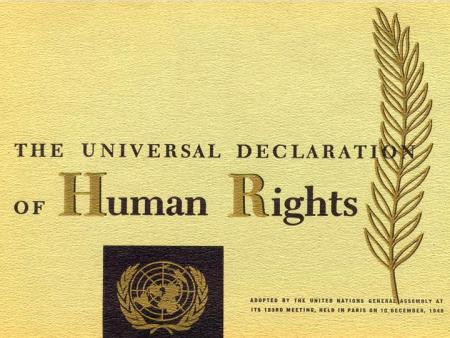
The Constitution of the Organization states as its first objective, the contribution to maintaining “…peace and security by promoting collaboration among the nations through education, science and culture in order to further universal respect for justice, for the rule of law and for human rights and fundamental freedoms”.
These universal values of human rights are at the heart of UNESCO’s mandate which explains why its contribution in the elaboration of the Universal Declaration of Human Rights has been considerable.
UNESCO’s contribution to the development of the Universal Declaration of Human Rights
In 1947 UNESCO created a committee on the theoretical bases of human rights which included leading intellectuals, philosophers and political scientists. A questionnaire was sent out to politicians and scholars, such as Mohandas Gandhi or Aldous Huxley, soliciting their opinion on the idea of a Universal Declaration of Human Rights.
Based on their responses, a report was prepared, showing that – despite cultural differences – Member States of the United Nations shared two great principles and common ideals, “the right to live a life free from the haunting fear of poverty and insecurity”.
The results of these actions facilitated the adoption of the Universal Declaration of Human Rights on 10 December 1948 in Paris. On the next day UNESCO proclaimed by a special resolution the importance of this Declaration for all activities of the Organization and undertook to make it know as widely as possible.
Human Rights within UNESCO’s direct competence
- Right to education (Article 26) ;
- Right to take part in cultural life (Article 27) ;
- Right to freedom of opinion and expression including the right to seek, receive and impart information (Article 19) ;
- Right to enjoy the benefits of scientific progress and its applications (Article 27).
Provisions of the Universal Declaration of Human Rights were introduced into national constitutions. They were further developed, codified and given binding force in numerous regional and international treaties for the protection of specific rights or rights of specific groups.
Special bodies have been created to monitor the implementation of some of these instruments. Much has been achieved in the fight against discrimination, promotion of gender equality and the protection of marginalized and vulnerable groups.
The Committee on Conventions and Recommendations: a unique mechanism
Within UNESCO, the protection of human rights is assured by the Committee on Conventions and Recommendations, working alongside the countries concerned. Relatively unknown, this committee examines cases and issues relating to complaints of alleged violations of human rights. From 1948 to 2007, amongst 545 cases that have been examined by the committee, 344 have been settled. A humanitarian approach and an open dialogue distinguish this procedure by its unique and specific mechanism compared to those existing in the United Nations system.
Human rights in the context of today’s challenges
Sixty years after the adoption of the Universal Declaration of Human Rights, UNESCO strives daily to improve knowledge and understanding of all human rights: whether civil, cultural, economic, political or social.
Education for and on human rights have become a priority for the Organization which is now recognized as a leader in this field within the United Nations system.
Another priority of UNESCO is the mainstreaming of human rights in all its areas of action and the pursuit at further integrating a human rights-based approach into its programmes, thereby increasing its contribution to the advancement of human rights. This approach can promote social cohesion with everyone’s participation, build respect for peace and non–violent conflict resolution and contribute to achieving positive social transformations.
Despite all the accomplishments, the situation of human rights in the world is far from satisfactory. But UNESCO is sparing no effort. It is actively participating in the identification of “emerging human rights” in the context of a modern global society where issues like multiculturalism and multilingualism have changed considerably. It also helps in strengthening the capacity of its Member States in dealing with problems such as climate change, uncontrolled scientific and technological development and nuclear threat, social transformations, which include the increasing gap between the rich and the poor, marginalization and discrimination, the weakening of Nation States, and defamation of religions and religious intolerance.
On many of these issues, UNESCO has adopted plans of action, which have helped progress considerably, such as the Universal Declaration on Bioethics and Human Rights in 2005 or the Universal Declaration on Cultural Diversity in 2001.
